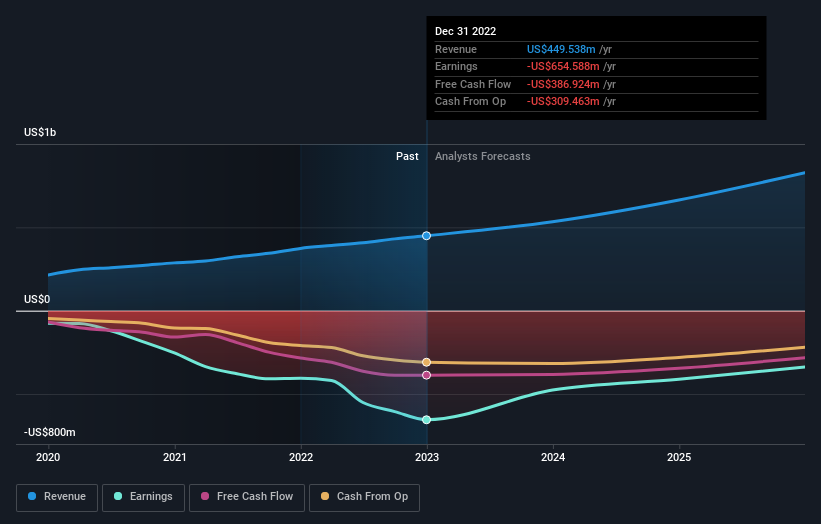In the wake of Guardant Health, Inc.'s (NASDAQ:GH) latest US$536m market cap drop, institutional owners may be forced to take severe actions
Key Insights
Institutions' substantial holdings in Guardant Health implies that they have significant influence over the company's share price
52% of the business is held by the top 8 shareholders
If you want to know who really controls Guardant Health, Inc. (NASDAQ:GH), then you'll have to look at the makeup of its share registry. We can see that institutions own the lion's share in the company with 85% ownership. Put another way, the group faces the maximum upside potential (or downside risk).
As a result, institutional investors endured the highest losses last week after market cap fell by US$536m. Needless to say, the recent loss which further adds to the one-year loss to shareholders of 48% might not go down well especially with this category of shareholders. Often called “market makers”, institutions wield significant power in influencing the price dynamics of any stock. Hence, if weakness in Guardant Health's share price continues, institutional investors may feel compelled to sell the stock, which might not be ideal for individual investors.
In the chart below, we zoom in on the different ownership groups of Guardant Health.
See our latest analysis for Guardant Health
What Does The Institutional Ownership Tell Us About Guardant Health?
Many institutions measure their performance against an index that approximates the local market. So they usually pay more attention to companies that are included in major indices.
We can see that Guardant Health does have institutional investors; and they hold a good portion of the company's stock. This suggests some credibility amongst professional investors. But we can't rely on that fact alone since institutions make bad investments sometimes, just like everyone does. If multiple institutions change their view on a stock at the same time, you could see the share price drop fast. It's therefore worth looking at Guardant Health's earnings history below. Of course, the future is what really matters.
Institutional investors own over 50% of the company, so together than can probably strongly influence board decisions. We note that hedge funds don't have a meaningful investment in Guardant Health. The company's largest shareholder is FMR LLC, with ownership of 15%. For context, the second largest shareholder holds about 9.6% of the shares outstanding, followed by an ownership of 8.8% by the third-largest shareholder. Furthermore, CEO Helmy Eltoukhy is the owner of 2.3% of the company's shares.
We also observed that the top 8 shareholders account for more than half of the share register, with a few smaller shareholders to balance the interests of the larger ones to a certain extent.
Researching institutional ownership is a good way to gauge and filter a stock's expected performance. The same can be achieved by studying analyst sentiments. Quite a few analysts cover the stock, so you could look into forecast growth quite easily.
Insider Ownership Of Guardant Health
The definition of an insider can differ slightly between different countries, but members of the board of directors always count. The company management answer to the board and the latter should represent the interests of shareholders. Notably, sometimes top-level managers are on the board themselves.
Most consider insider ownership a positive because it can indicate the board is well aligned with other shareholders. However, on some occasions too much power is concentrated within this group.
We can see that insiders own shares in Guardant Health, Inc.. This is a big company, so it is good to see this level of alignment. Insiders own US$118m worth of shares (at current prices). If you would like to explore the question of insider alignment, you can click here to see if insiders have been buying or selling.
General Public Ownership
The general public-- including retail investors -- own 10% stake in the company, and hence can't easily be ignored. This size of ownership, while considerable, may not be enough to change company policy if the decision is not in sync with other large shareholders.
Next Steps:
While it is well worth considering the different groups that own a company, there are other factors that are even more important. Consider for instance, the ever-present spectre of investment risk. We've identified 3 warning signs with Guardant Health , and understanding them should be part of your investment process.
If you would prefer discover what analysts are predicting in terms of future growth, do not miss this free report on analyst forecasts.
NB: Figures in this article are calculated using data from the last twelve months, which refer to the 12-month period ending on the last date of the month the financial statement is dated. This may not be consistent with full year annual report figures.
Have feedback on this article? Concerned about the content? Get in touch with us directly. Alternatively, email editorial-team (at) simplywallst.com.
This article by Simply Wall St is general in nature. We provide commentary based on historical data and analyst forecasts only using an unbiased methodology and our articles are not intended to be financial advice. It does not constitute a recommendation to buy or sell any stock, and does not take account of your objectives, or your financial situation. We aim to bring you long-term focused analysis driven by fundamental data. Note that our analysis may not factor in the latest price-sensitive company announcements or qualitative material. Simply Wall St has no position in any stocks mentioned.
Join A Paid User Research Session
You’ll receive a US$30 Amazon Gift card for 1 hour of your time while helping us build better investing tools for the individual investors like yourself. Sign up here

 Yahoo Finance
Yahoo Finance 

